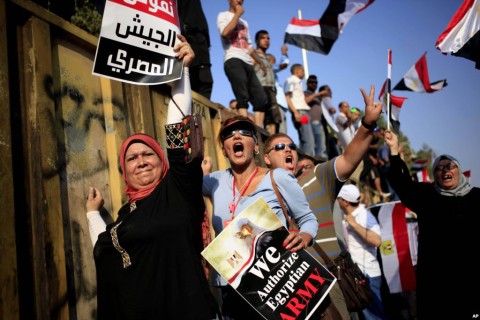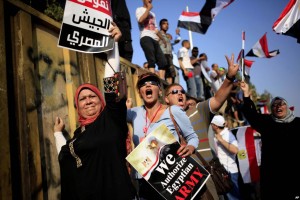Would Egyptians Get It Right?
Articles/Opinion, Latest Headlines Sunday, May 4th, 2014
Oyewale Oyelola
Egyptian on 26 and 27 of May 2014 will go to polling stations to elect their president for the second time with three years after revolution.
El-Sisi, former head of Egyptian Military and Hamdeen Sabahi, a former presidential candidate in the 2012 presidential election were announced as the official candidates by the Presidential Election Commission on 2 May 2014.
 The poser now is that would Egyptian get it right this time? Egypt has been bedeviled with protests and violence since the beginning of Arab Uprising, later Egyptian revolution in January 2011 that led to outer of President Hosni Mubarak.
The poser now is that would Egyptian get it right this time? Egypt has been bedeviled with protests and violence since the beginning of Arab Uprising, later Egyptian revolution in January 2011 that led to outer of President Hosni Mubarak.
The Arab spring uprising began in Tunisia in January 2011 with the death of 26 year-old Tunisian Mohamed Bouazizi lit the fuse that ended his life on December 17, 2010, his death ignited the current unrest sweeping the Middle East. Bouazizi, a street vendor, set himself on fire in despair and in protest of his treatment at the hands of local authorities.
The tragic circumstances surrounding Bouazizi’s self-immolation sparked protests in his rural hometown and later spread to other part of the country, which led to end of President Ben Ali rule in January 2011 after more two decades rule in Tunisia.
The Arab spring uprising later spreads to Egypt, Libya, Yemen, Syria and other countries in Middle East.
On the 25th of January, 2011 Egyptians started protest in Tahir square calling for resignation of Hosni Mubarak as Egypt President.
The regime of Hosni Mubarak tagged ‘the bad guy’ with all that implied; the corruption, police brutality, and overall degradation of human dignity in Egyptian society were clearly associated with his office.
Hosni Mubarak resigned on February 11, 2011 after 30years rule in Egypt, just 18 days of Mass protest that led Egyptians to occupy Tahir Square now Freedom Square. Egypt Revolution was unique as 79 percent of Egyptians including the military supported the revolution thereby calling resignation of Mubarak.
The ouster of Mubarak led to rising popularity of Muslim Brotherhood banned during Mubarak regime.
Muslim Brotherhood capitalized on active role played by their members during the revolution to mobilize support for their party and party later won majority of the parliamentary seats and presidency.
Muslim brotherhood political wing, Freedom and Justice party won over 228 out 508 seats in The People’s Assembly of Egypt, thereby give Muslim brotherhood simple majority with 45percent in the parliament. Mohammed Morsi polled 10,138,134 votes (37.5percent) to defeat his closest opponent Emad Abdel Ghaffour of Islamic Bloc party who polled 7,534,266votes (25percent)
Although the original “Jan25 revolutionaries,” made up of rights campaigners, civil society activists and others, had no plan during that 18 day uprising except to persist and persevere. They were joined by many others and no one can now claim the uprising was theirs alone. The crowds that swept into the different squares of Egypt over those days were representative of Egyptian society in general not simply one sector of it.
Those that backed the Islamist forces of the Muslim Brotherhood would feel great pride as confidence in its political party went from 15% in the aftermath of the uprising, to a high of 67% a year later. But they would also feel great disappointment: just prior to the June 30th ouster of Mohamed Morsi, Gallup polls and others showed the political force of the Muslim Brotherhood had lost most of its post-uprising popular support over its year in power.
Mohammed Morsi failure to carry along other political interests in his administration and his over bearing attitude led to his fall which now turned the most cherished people’s revolution to cause for the Egyptians.
Morsi in his bid to get rid of judges that work with ouster President Mubarak dropped retirement age for Judge to 60 from 70 years. He also empowered parliament to issue Islamic Bonds without inputs from Al-Azhar compromising islamic scholars.
The muslim fundamentalist president proposes bill to regulate NGOs and human right groups. The law allows government to control access to funds by NGOs and human right groups.
Political analysts and human right groups believe that government intends to regulate human right groups activities to avoid revolution, as Morsi regime was becoming autocratic.
He also defied a court ruling by Supreme constitution court whose ruling is final and not subject to appeal, that the parliamentary election had been illegal, and ordered the brotherhood-dominated legislature back to work.
Aside all the misdeeds, he appointed his supporters, especially from Freedom and Justice party.
The issuance of seven-points decree by Morsi which gave him judicial powers led to protest and violence broke out in front of the President Palace killing at least 10 in April, 2013. Remark of Morsi to the death of the 10 Egyptians when he was quoted as saying, “I cannot compromise because my enemies have not yet been vanquished”, led to another round of protest where 54 people died.
Despite all the protests and appeal by other political parties for Morsi to review some of his decisions, he remains adamant that he will not change the decree which makes him more powerful that the Judiciary.
The Egyptian Military which played important role in the revolution on June 23, 2013 warned Morsi that they would intervene if he fails to reach agreement with the opposition. El sissi, head of military on June 30,2013 gave Morsi 48hours ultimatum to create road map for peace and about 14million Egyptians was already protesting across the country.
Military therefore over throw the government and arrested Mohammed Morsi after the expiration of the ultimatum.
Muslim brotherhood are now designated as a terrorist organisation by the military backed interim government and over 1000 Muslim brotherhood members have been sentenced to death for defiling government law against public protests.
Egyptians as they prepare to elect a new president in May 2014, they must put the religion and political sentiment apart to elect president that will rebuild the country and restore law and order.
The initial aim for Egyptian Revolution was to bring freedom to Egyptians and promote justice in country that has been under autocratic rule for decades.
Any party that emerge victorious in the election should run all inclusive government which will protect interests of all section of the society. The new president must embark on economic reform that would improve the lives of Egyptians, as unemployment rate is about 15percent.
Egypt cannot afford to go back to street again. The election should mark positive turning point for Egypt as the 2011 Revolution has not really brought positive impact to lives of Egyptians due to violence and protests.
Related Posts
Short URL: https://www.africanexaminer.com/?p=10784






















